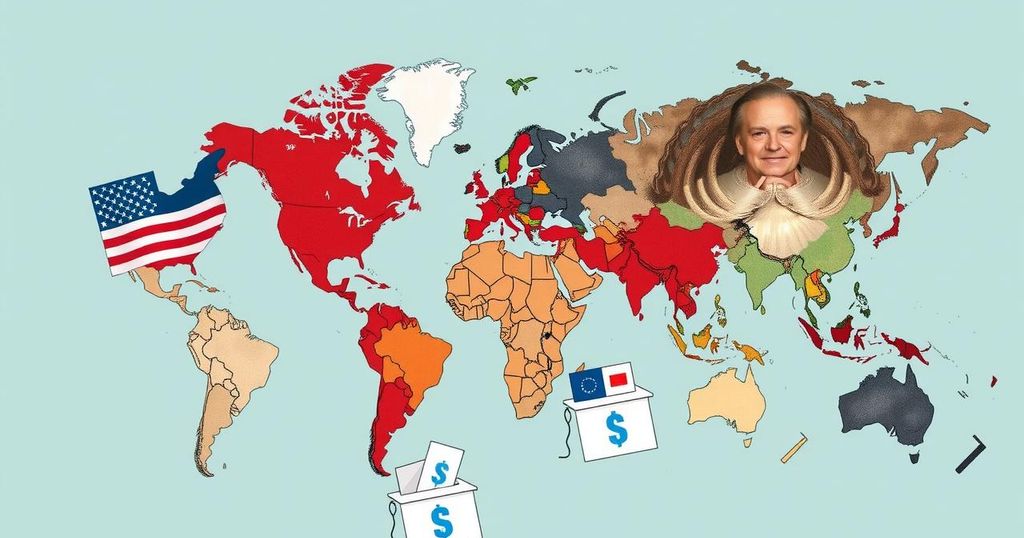Turbulent Times: Global Elections Indicate a Shift Towards Anti-Incumbency

In 2024, approximately 70 countries reported a significant anti-incumbent sentiment in elections, with voters frustrated by economic hardships and social inequalities. Notable political shifts included the loss of longstanding administrations in countries such as South Africa, India, and the UK, while allegations of foreign electoral interference grew. The electoral landscape remained complex as authoritarian movements gained traction, signaling significant challenges for the future of democracy.
The year 2024 has been characterized by significant political upheaval around the globe, with voters expressing their dissatisfaction with incumbent administrations across numerous nations. Approximately 70 countries, representing half of the world’s population, participated in elections, resulting in a prevailing sentiment of rejection—”You’re fired”— directed toward sitting governments. Economic instability and persistent dissatisfaction stemming from the pandemic have fueled a trend of anti-incumbency that has reshaped the political landscape in various regions, including Africa, Europe, Asia, and the Americas.
A notable feature of this electoral year was the surge in votes for anti-establishment candidates and movements, as voters expressed their frustration with traditional party politics. In South Africa, the long-dominant African National Congress suffered significant losses, and in India, Prime Minister Narendra Modi’s party lost its majority in a stunning electoral upset. Globally, many long-standing administrations were ousted, reflecting a common thread of public discontent over issues including inflation, social inequality, and governance.
Amid this volatility, a worrying trend has emerged regarding allegations of electoral interference and disinformation campaigns. Reports indicate that foreign actors, particularly from Russia, have sought to manipulate political sentiments, affecting electoral integrity in various nations. Furthermore, the rise of authoritarian sentiments has gained traction in several countries amid an overarching trend of fragmentation in established political structures, complicating governance and party alignment.
As we analyze the events of 2024, the prevailing sentiment encompasses both urgent concerns regarding electoral processes and a persistent yearning for democratic stability, highlighting the contradictions inherent in contemporary politics. This tumultuous year has surfaced mounting challenges for democracies worldwide, raising critical questions about public trust in political systems and the future trajectory of governance across nations.
The year 2024 has been pivotal for global democracy, with a multitude of elections reflecting profound public discontent with existing governments. With over 70 nations participating, this electoral cycle revealed a strong anti-incumbency trend fueled by dissatisfaction resulting from economic hardships, social issues linked to the COVID-19 pandemic, and geopolitical instability. Observers have noted a growing influence of extreme political factions, complicating the traditional dichotomy of political alignment and leading to irregularities in democratic processes.
The events of 2024 underscore a turbulent moment for global democracy, marked by widespread rejection of incumbents, the emergence of extremist movements, and the troubling rise of disinformation and electoral interference. Challenges to established political parties suggest a fundamental shift in voter priorities, as the electorate grapples with ongoing social, economic, and political crises. Moving into 2025, ongoing instability and evolving political landscapes will significantly affect democratic practices worldwide.
Original Source: www.clickondetroit.com








